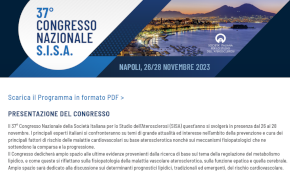 Rivista in lingua italiana
Rivista in lingua italiana
riservata ai Soci SISA
Ultimo numero:
Anno 14 • N.4/2023
Abstract
Effect of Evolocumab on Progression of Coronary Disease in Statin-Treated Patients: The GLAGOV Randomized Clinical Trial
Nicholls SJ, Puri R, Anderson T, Ballantyne CM, Cho L, Kastelein JJ, Koenig W, Somaratne R, Kassahun H, Yang J, Wasserman SM, Scott R, Ungi I, Podolec J, Ophuis AO, Cornel JH, Borgman M, Brennan DM, Nissen SE.
JAMA 2016 Epub ahead of print Nov 15
Importance: Reducing levels of low-density lipoprotein cholesterol (LDL-C) with intensive statin therapy reduces progression of coronary atherosclerosis in proportion to achieved LDL-C levels. Proprotein convertase subtilisin kexin type 9 (PCSK9) inhibitors produce incremental LDL-C lowering in statin-treated patients; however, the effects of these drugs on coronary atherosclerosis have not been evaluated.
Objective: To determine the effects of PCSK9 inhibition with evolocumab on progression of coronary atherosclerosis in statin-treated patients.
Design, Setting, and Participants: The GLAGOV multicenter, double-blind, placebo-controlled, randomized clinical trial (enrollment May 3, 2013, to January 12, 2015) conducted at 197 academic and community hospitals in North America, Europe, South America, Asia, Australia, and South Africa and enrolling 968 patients presenting for coronary angiography.
Interventions: Participants with angiographic coronary disease were randomized to receive monthly evolocumab (420 mg) (n = 484) or placebo (n = 484) via subcutaneous injection for 76 weeks, in addition to statins.
Main Outcomes and Measures: The primary efficacy measure was the nominal change in percent atheroma volume (PAV) from baseline to week 78, measured by serial intravascular ultrasonography (IVUS) imaging. Secondary efficacy measures were nominal change in normalized total atheroma volume (TAV) and percentage of patients demonstrating plaque regression. Safety and tolerability were also evaluated.
Results: Among the 968 treated patients (mean age, 59.8 years [SD, 9.2]; 269 [27.8%] women; mean LDL-C level, 92.5 mg/dL [SD, 27.2]), 846 had evaluable imaging at follow-up. Compared with placebo, the evolocumab group achieved lower mean, time-weighted LDL-C levels (93.0 vs 36.6 mg/dL; difference, -56.5 mg/dL [95% CI, -59.7 to -53.4]; P < .001). The primary efficacy parameter, PAV, increased 0.05% with placebo and decreased 0.95% with evolocumab (difference, -1.0% [95% CI, -1.8% to -0.64%]; P < .001). The secondary efficacy parameter, normalized TAV, decreased 0.9 mm3 with placebo and 5.8 mm3 with evolocumab (difference, -4.9 mm3 [95% CI, -7.3 to -2.5]; P < .001). Evolocumab induced plaque regression in a greater percentage of patients than placebo (64.3% vs 47.3%; difference, 17.0% [95% CI, 10.4% to 23.6%]; P < .001 for PAV and 61.5% vs 48.9%; difference, 12.5% [95% CI, 5.9% to 19.2%]; P < .001 for TAV).
Conclusions and Relevance: Among patients with angiographic coronary disease treated with statins, addition of evolocumab, compared with placebo, resulted in a greater decrease in PAV after 76 weeks of treatment. Further studies are needed to assess the effects of PCSK9 inhibition on clinical outcomes. Trial Registration: clinicaltrials.gov Identifier: NCT01813422.
JAMA 2016 Epub ahead of print Nov 15

Area Soci
Eventi



 SISA LIPID ACADEMY - Corso avanzato di lipidologia clinica
SISA LIPID ACADEMY - Corso avanzato di lipidologia clinicaModena, 22-23 Giugno 2023
[continua a leggere]Giornale Italiano Arteriosclerosi
HoFH today
 Rivista Italiana della
Rivista Italiana della
Ipercolesterolemia
Familiare Omozigote
Anno 5 • N.1/2023
Rivista NMCD
Diateca
[continua a leggere]
[continua a leggere]
Newsletter
il vostro indirizzo di posta elettronica
Progetto LIPIGEN

Nuovo sito dedicato al Progetto LIPIGEN
Progetto LIPIGEN - Vecchio portale
E' necessario essere loggati come utente
Lipigen per poter accedere alla pagina
PROject Statin Intolerance SISA
PROSISA – PROject Statin Intolerance SISA
E' necessario essere loggati come utente
PROSISA per poter accedere alla pagina
GILA - Lipoprotein Aferesi
Gruppo Interdisciplinare Lipoprotein Aferesi
(Accesso Gruppo GILA-Lipoprotein Aferesi)
E' necessario essere loggati come utente del Gruppo GILA per poter accedere
Gruppo Interdisciplinare Lipoprotein Aferesi
(Documentazione ad accesso libero)
Pagina informativa per medici e pazienti








